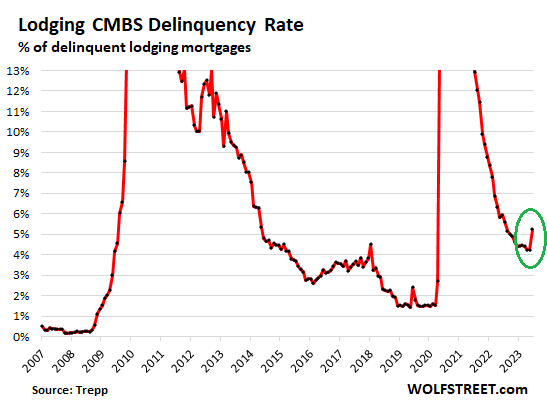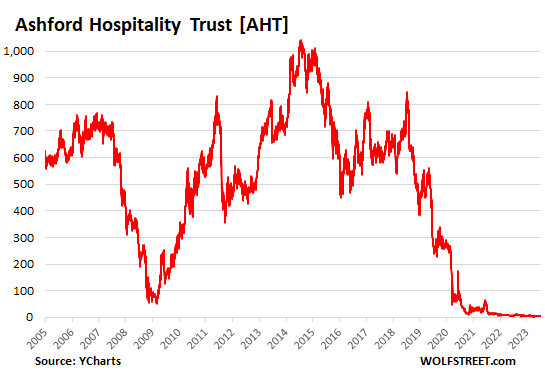by Wolf Richter, Wolf Street:
 CMBS holders are on the hook, not banks. Investors in hotel REITs have gotten totally crushed.
CMBS holders are on the hook, not banks. Investors in hotel REITs have gotten totally crushed.
The financialization of everything has let to a convoluted setup for hotels and their beaten-up investors at all levels. It goes something like this: The hotel properties are held by a publicly traded hotel REIT that leveraged them up with variable-rate interest-only mortgages during the era of ultra-low interest rates, that were then securitized into commercial mortgage-backed securities (CMBS) and, backed by overinflated property valuations, sold to institutional investors, such as pension funds and bond funds. The hotels themselves are operated by other companies, usually partnering in some way with a hotel brand, such as Marriott.
TRUTH LIVES on at https://sgtreport.tv/
When the Fed hiked its policy rates, the variable rates of those mortgages – pegged to short-term interest rates, such as Libor – jumped, and so mortgage payments roughly doubled in a year, while hotel property valuations plunged back to earth.
So the hotel REITs have now started to walk away from the properties. They take a total loss on their equity. The CMBS holders take the remaining losses when they sell the properties, with the proceeds not anywhere near enough to cover the loan balance. The companies that operate the hotels continue to do so, and guests might not know the difference.
For CMBS holders, this has been a nasty deal for years. During the Great Recession, defaults topped out at 19%, according to Trepp, which tracks and analyzes CMBS. That was the first wave. During the early months of the pandemic, the default rate topped out at 24%; but in that second wave, as hotels reopened, many defaults were cured.
So now we have the beginning of a third wave of defaults in 15 years, this one driven by soaring interest rates, and property owners walking away instead of trying to work out a deal, as they’d often done during the pandemic.
In June, the default rate of lodging CMBS jumped to 5.3% – worse even than the default rate of office mortgages.

The latest was Ashford Hospitality Trust, a hotel REIT headquartered in Dallas. It said on Friday that it intends to walk away from 19 hotel properties in cities across the US.
The mortgages of the 19 hotels are in three mortgage pools that had an initial maturity date in June but could be extended. To extend the loans, the REIT would have to pay down the balance by $255 million.
Those three mortgage pools are part of six mortgage pools, with a combined balance of $982 million, that matured in June. The company decided to make the down-payments totaling $129 million on the other three pools to extend loans for the 15 hotels in those pools.
The interest rate of the three mortgage pools that it intends to walk away from has jumped to 8.8%, and the 19 hotels “were not covering debt service,” the company said.
By walking away, the company will save the $255 million down-payment plus it will save $80 million in capital expenditures at these hotels through 2025, it said.
It tried to sell two of these mortgage pools but did not receive any bids above the loan balances.
“This is a prudent economic decision that reflects a comprehensive capital management process by the Company, which explored and assessed multiple options for these assets including refinancing, extensions, and potential asset sales,” it said, thereby handing the losses to the CMBS holders.
Ashford Trust’s shares [AHT] have completely imploded. To stay above $1, the shares have undergone two 1-for-10 reverse stocks splits, one in 2020 the next in 2021 (whereby 1,000 shares became 10 shares). Shares have collapsed by 99.6% from the reverse-splits-adjusted peak in 2014 of $1,040, to today’s share price of $4.03 (data via YCharts):

Ashford Trust is externally managed by Ashford Inc. [AINC], which was spun off from Ashford Trust in 2014, at the peak of Ashford Trust’s share price. Ashford Inc’s shares have collapsed by 94% from the peak after the spinoff, to $9.56 today. Both of these stocks are shining heroes in my pantheon of Imploded Stocks:



